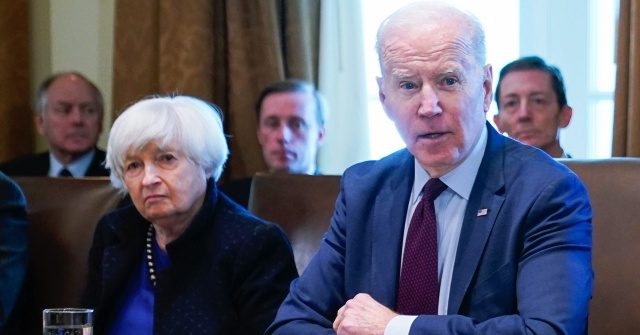

The White House’s newest economic catchphrase to blunt the force of a potential recession in 2023 is to tell the American people that it is not “inevitable.”
On Sunday, members of President Joe Biden’s team told the establishment media four separate times that inflation is not inevitable, despite polling and data that suggest a probability of recession.
“A recession is not inevitable,” Energy Secretary Jennifer Granholm said on CNN’s State of the Union.
“The president really wants to have a steady and stable recovery,” she added.
Treasury Secretary Janet Yellen said on ABC News’s This Week that she does not “think a recession is at all inevitable,” but acknowledged “inflation is unacceptably high.”
“It’s President Biden’s top priority to bring it down,” Yellen added.
Director of the National Economic Council Brian Deese used similar phrases on CBS News’s Face The Nation and Fox News Sunday.
“What I would say is that not only is a recession not inevitable, but I think that a lot of people are underestimating those strengths and the resilience of the American economy,” Deese said on CBS.
On Fox News, Deese again used the “not inevitable” catchphrase. “Not only is a recession not inevitable, but what we as policymakers can do is take steps to build on our unique strengths in the American economy,” Deese said.
Though the White House has decided to use the catchphrase to play down the potential recession, a June poll among chief financial officers (CFOs) showed the economy is likely to go into a recession due to 40-year-high inflation, record-high gas costs, rising interest rates, and supply chain woes. Breitbart News reported:
Seventy-seven percent of CFO’s responding to a CNBC survey say the economy will experience a recession in the first half of next year. The rest think a recession will occur in the second half of 2023. None think the economy can avoid a recession altogether next year.
This gloominess has arisen because of persistent inflation and the Federal Reserve’s policy of tightening monetary conditions to bring down inflation.
Forty-one percent of CFOs say that inflation is the number one external threat to their business. That is more than twice the share who cited inflation in the June 2021 survey. In the first quarter of 2021, no CFOs said inflation was the bigger risk faction.
The sour forecast seems lost on Biden, who has also taken to using the newest catchphrase. A recession is “not inevitable,” he said in a Thursday interview with the Associated Press. In the same interview, he also insinuated that inflation was not his fault:
If it’s my fault, why is it the case in every other major industrial country in the world that inflation is higher? You ask yourself that? I’m not being a wise guy. Someone should ask themself that question. Why? Why is it? If it’s a consequence of our spending, we’ve reduced the deficit. We’ve increased employment, increased pay. There was a survey done uh, uh, by the, uh, I forget which one it was.
On the campaign trail, then-candidate Joe Biden promised to wage a war on the American oil industry by terminating subsidies and drilling feasibility. “I want you to look at my eyes. I guarantee you, I guarantee you we’re going to end fossil fuels,” he said in 2019.
“No more subsidies for the fossil fuel industry,” Biden stated on stage during a 2020 Democrat primary debate. “No more drilling, including offshore. No ability for the oil industry to continue to drill, period,” candidate Biden said of his energy policies if he should win the presidency. “It ends.”
According to the Energy Information Administration (EIA), Americans will pay $450 more for gas in 2022 than they did last year on an inflation-adjusted basis. In 2022, inflation is projected to cost families an additional $5,520 per year, or $460 per month, according to Moody’s.
Follow Wendell Husebø on Twitter and Gettr @WendellHusebø. He is the author of Politics of Slave Morality.




